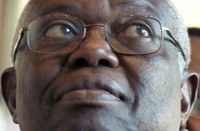 "Africa will only be able to achieve sustained economic development through science- and technology-based initiatives that are led and driven by the African people", says Jean-Pierre Ezin (TWAS Fellow 2009), Commissioner of Human Resources, Science and Technology in the African Union.
"Africa will only be able to achieve sustained economic development through science- and technology-based initiatives that are led and driven by the African people", says Jean-Pierre Ezin (TWAS Fellow 2009), Commissioner of Human Resources, Science and Technology in the African Union.
Ezin made his remarks at the 6th Science Centre World Congress held in Cape Town, South Africa, at a conference session organized by TWAS.
To advance this goal, Ezin notes, "Africa must invest in its people, build the necessary infrastructure and provide an enabling environment" that encourages countries across the continent "to nurture and produce new scientific and technological products pertinent to Africa's development priorities."
The key, says Ezin, is to create a culture of scientific research, innovation and entrepreneurship that is embedded in all aspects of human capacity development.
Science centres, Ezin observes, could play an important part in this effort. But finding funding for such centres is a challenge for many African countries. Today, by some estimates, the continent has just 32 science centres compared to more than 2,400 worldwide.
He suggests that there are two broad strategies that could be adopted to promote the development of science centres in Africa. The first would seek to strengthen and expand the scope of activities at universities and research centres where public outreach initiatives, such as those associated with science centres, could be placed within existing institutional frameworks. The second would seek to build entirely new science centres.
For Ezin, the need for science centres reflects a larger challenge facing the scientific community in Africa. Scientific research "must address the critical issues facing the continent." The public, he adds, needs to have access to places where they can learn about the contributions that science makes to their daily lives. "A scientifically enlightened society", he says, "is likely to be a more prosperous society."
Ezin appreciates how difficult it is to encourage scientists to become involved in science centres. "Scientists", he observes, "are guided by priorities, aspirations and standards" that "may not be shared by the public. Competition for grant money, the importance placed on journal publications and the need for peer recognition seem to be the greatest motivators."
He urges African scientists to shift their research priorities to challenges that "have social relevance and meaning". One of the best ways to promote a culture of science, Ezin notes, is for scientists to devise a research agenda that "produces beneficial results that the public can see."
In line with this goal, Ezin says it is imperative that Africa make significant investments in "the popularization and public understanding of science" through a broad range of activities that include the creation of science centres. Such efforts, he concludes, "would benefit both science and society."
For additional information about the 6th Science Centre World Congress, which took place 4-8 September 2011, see www.6scwc.org.

